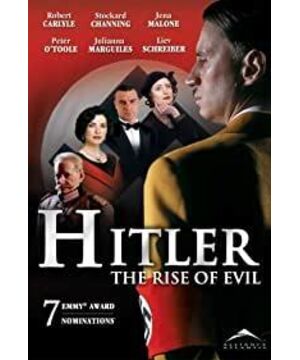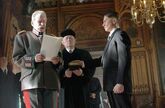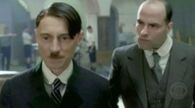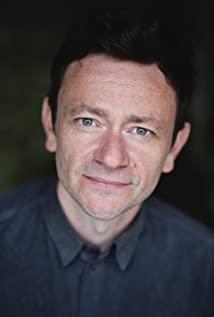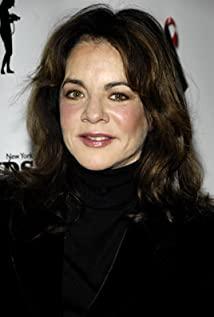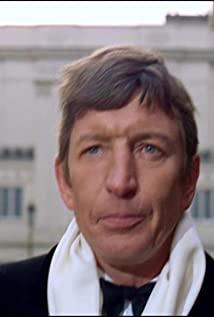I was fortunate enough to learn about it through this film today.
The film mainly tells the story of Hitler (born in 1889) when he was a child to create a political party and become a climate.
The beginning of the movie is a sentence from the British political scientist Burke in the eighteenth century, "The only condition for the victory of the wicked is that the good man stands by." The beginning of this sentence should be the whole plot. There are also in the movie, who appeared as a journalist, but his personal power is too small, when he exposed Hitler in public opinion, Hitler has become a climate.
In this movie, there are so many big figures, Hitler, the government representative von Karl, the military representative Ludendorff, and the small army leader Captain Luen who supported each other in the early days of Hitler, Hitler's right-hand man Rona Green and Na The only sensible good news reporter Ge Lihe.
The overall plot revolves around these people.
Hitler's father and mother were consanguineous, uncle and niece. The father respected the spirit of chivalry. The so-called chivalry is a kind of feudal ideology. A feudal lord with slavery. And when my father said, "Chivalry is the ideal of Germany, he is the embodiment of strength and purity. What the movie shows us is Hitler's young and hateful eyes. And when the father encourages Hitler to study hard and sit in power, Called "complete idiot".
The film shows us at the beginning the hatred between Hitler and his father, this tone. There is no detailed explanation of why, maybe a scene is used to replace these complex hatred formation process, "Father" as My uncle married his niece, and he was sent by God to punish me.” Yes, this sentence can simply explain that Hitler lacked fatherly love when he was young.
Many years after his father died of illness, Hitler’s mother was investigated Born with breast cancer,
Hitler wanted to study art far away, but his mother didn't support it.
The doctor told Hitler that he would not live this Christmas. Hitler was already a young man at this time, and he said, "This is not true, she will do anything to destroy her future." The movie has created some of Hitler's paranoid characters here. After the death of his mother, when his half-sister comforted him, he scolded him loudly, which showed his paranoid character very fully.
His road to learning painting in other places was not bright, and the dean rejected him. The editor has to complain, isn't this dean the sinner of World War II?
He walked on the street alone with hatred in his eyes, because he had no money to sleep on the street. The passers-by and the mayor instilled in him that the reason why Germany is like this and life is so unsatisfactory is that all this is caused by the Jews. Here he was infected, nationalism, and finally developed to the extreme.
In the morning of 1913, the swastika, the logo of the voluntary school, was streaked across dusty forks and dry bread, implying that this was the darkest period for future Nazi leader Hitler.
In 1914, he took the inheritance from his sister and came to Munich, Germany. Newsboy cries "Austrian prince assassinated" unfolds against the backdrop of the First World War.
When he first came here, he was exposed to the first speech he heard in his life, and was infected to join the army.
In the army, Hitler was the most active, and he was the first to volunteer when there was a life-threatening task that others would avoid in time. And after the second mission, he used his own words to persuade the officer to fulfill his promise and give him a medal and a cross.
But there is a detail in the plot. The editor noticed that he picked up a puppy on the way of the mission. At that time, the editor was still thinking that Hitler was still kind. But the editor was wrong. He later ordered the puppy to sit down, but the puppy was disobedient. Making Hitler very angry in front of his comrades, he chased the puppy out of the camp and beat it with a leather whip. The film used a shy approach here to show Hitler's brutality and ruthlessness very fully.
Also, he was injured and hospitalized. He was very angry and made a fuss when he heard that someone had self-mutilated to escape the war. The editor here wants to say that Hitler was still quite patriotic and responsible at that time.
In the army, Hitler was telling the people around him the abominations of the Jews all the time. Said Jews would not join the army. The plot happened to arrange for a Jew to stand up and refute. In doing so, it alludes to the blind and unrealistic, racism that Hitler hated.
During his last battle, he was nearly killed by a gas bomb. When he woke up, he was greeted with news of Germany's surrender. He couldn't take it, screamed frantically, woke up in a nightmare, tore off the bandage, and the blood-red eyes affected by the gas bomb interpreted the word "hatred". The phrase "it's not over" ended World War I and heralded the end of World War II.
Munich, Germany, 1914.
Dozens of parties emerged in Germany under a democratic system.
In addition to the Workers' Party, the Communist Party was the most popular at that time, and Captain Luen led the army back to Munich to massacre the Communist Party. News reporter Ge Lihe witnessed and recorded it all on his way to the wedding.
Hitler went to hear the Workers' Party speech as Lohn's informant. Adding his own opinions and showing his racism more clearly in the document he submitted, he said "Imagine how pure this place would be without Jews. Are there Jews in heaven?"
Hitler was very supportive of Workers' Party politics spirit, and gave his first speech here. Hitler's speech at this time, whispered and cringed. But he dared to speak out about his madness.
He kept handing out leaflets on the street and learning vocabulary in the newspapers. His speeches are also increasingly persuasive and resonant. More and more Germans are willing to listen to his speech, support him and applaud him. He is undoubtedly on the road to success. Direct the hatred of a small group of Germans towards the Jews.
Hitler donated all the money from his speeches to Captain Rune. A mutual aid agreement was reached.
The picture turns to a nightclub opened by Jews. The Jewish boss said, "Germany doesn't need democracy, just music and laughter." The editor here has thought about the arrangement of this sentence for a long time, perhaps saying that Jews love peace and not war.
As Hitler's future friend and right-hand man, Hanf Danger was deeply impressed after listening to Hitler's speech. Hanf Danger is a gentleman who can play a good piano. In the plot, he is Hitler's comforter, packer, and advice on propaganda. It was he who gave Hitler the idea to design the swastika temperament. Hitler thought it had invincible power.
Hitler's hatred of nationalism and Jews was deeply rooted, which may have something to do with his paranoid character. There was a scene where there was a Jewish gathering, and he was arguing with the Jews. Even if someone made him go down the stairs, he was unwilling to avoid it. And a Jewish sentence expresses Hitler's psychology. "The hatred of the Chinese people has achieved his personal goal."
Compared with the avoidance of Jewish comrades-in-arms faced in World War I, it is an escalation.
Hitler's arrival and speech brought earth-shaking changes to the Workers' Party. Its thinking is also more and more obedient to Hitler. There are bound to be differences in decision-making within an organization, and Hitler's investment has paid off, with the help of the military to clean up the party and take over the chairmanship smoothly. By this point, he has already gained a lot of support and influence from the masses.
But the plot took a twist.
The German chancellor agreed to pay war reparations and honor the Treaty of Versailles. This made the life of the German people more difficult and the people rioted. A German cabinet member issued a national emergency decree, believing that Hitler's speech would fuel the insurrection. Von Karl cancels Hitler's speech schedule.
This certainly makes for a blow to Hitler. Hanf Danger, the Nazi propaganda minister and Hitler's friend, comforted him. He believed that Hitler was already quite influential and promoted Hitler's revolution. He introduced newsman Ge Wenhe, who also wrote articles for Von Karl, hoping to catch Von Karl from him and participate in the revolution. But Gewenhe did not support Hitler. He and von Karl commented on Hitler as "crazy! Crazy!" This undoubtedly reflects the rationality of the media person.
Hitler launched a violent conflict between the Workers' Party and the Communist Party, and von Karl had to surrender. Adopt a soft policy to appease Hitler, and promise a cabinet position. But Von Karl didn't take Hitler seriously. Hitler also selectively listened to von Karl's advice. To persuade his ally, Captain Rune, to calm down recently.
On the other hand, Hitler is also connected with General Ludendorff, who is a right-wing nationalist. Here, the editor feels that most of the Germans in the whole plot have pure German blood ideas, and most of them have national columnism. Rodendorf once said, "We need real Germans to rule the country." Looking back at the first speech Hitler saw, they also made a great claim that they were of Germanic blood and should join the army.
The Cologne Circus speech in 1923, in my opinion, was another turning point in the plot. With party members wearing armbands in the row below the podium, the Workers' Party has grown in size. And here Hitler's speech talent is even more fully displayed, with the gestures, the sweat on his face, the excited and crazy expressions, and the highly provocative remarks, he succeeded. People cheered Hitler and raised the iconic gesture. It has to be said that Hitler was a great speaker.
Due to von Karl's tricks, he planned to abandon Hitler. Hitler was emboldened by popular support. On November 8 of this year, Hitler and the Workers' Party planned to take Berlin.
There are three images here, one of von Karl's speech attacking the Workers' Party, one of the singing of Jewish nightclub dancers, and one of Hitler leading a neatly dressed and armed army. Three pictures suggest the arrival of the climax. The dancer's singing is a hint, rendering.
Hitler captured von Karl and other government officials, and coerced them to support Hitler. Hitler even won the support of the masses, but the plan did not catch up with the changes. Ludendorff betrayed Hitler, and he said, "That dwarf really succeeded?!" The surprised irony tone completely ignored Hitler. It even released von Karl after Hitler left, using a hilarious and lame reason to "fear that their wives were worried." In the
end, Hitler's coup failed, and people fled in a hurry. Hitler fled to the house of his good friend Hanf Danger, and with the unbelievable panic in his eyes through the car window, he had to admit that he failed. Hitler intended to shoot himself, but was persuaded by Hanfdanger's wife. Hitler's heart was so chaotic that he was startled even when he saw the gun in the mirror.
Hitler was imprisoned, numb and sluggish. Mouth recited words, protested by hunger strike.
in the court
"Hitler, you were charged with treason, do you plead guilty?"
"I admit it"
people exclaimed, can't believe he just admitted that
"if you go and get back what was stolen, are you guilty?"
People applauded .
The accusers protested that it was not a speech, but the judge ignored it. Indeed, Hitler's speech was so attractive.
Hitler succeeded in sophistry of treason into "the charge of fighting for the rights of the Germans" through his speeches.
Hitler captured the hearts of the Germans, and he succeeded again.
The newsman Ge Wenhe suddenly woke up after listening to his wife's advice, and returned to the newspaper to criticize Hitler.
The sentence was pronounced on the last day,
"Hitler is convicted of treason..." People exclaimed
"200 marks in gold..." People talked about
"5 years in prison..." People exclaimed even louder
"You can be released on parole after 9 months! "The people cheered.
Yes, the German people supported him, and despite his failed coup, he was victorious in another way.
-end-
Hitler, historically a war maker, a murderer.
Later generations gave him mixed reviews.
Great statesman, great orator, butcher, warmonger, paranoid, great man.../Tunyun
View more about Hitler: The Rise of Evil reviews


